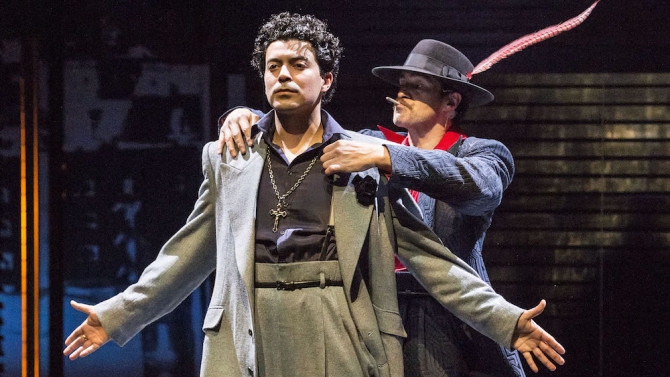Variety

FEBRUARY 14, 2017 | 01:44PM PT
Now 76, Chicano theater pioneer Luis Valdez returns to the Mark Taper Forum with a revival of the play that flipped the script for Latino representations on stage.
Back in style after 40 years, Luis Valdez’s “Zoot Suit” is as custom-tailored a Los Angeles stage experience as they come: Commissioned back in 1977 by Center Theatre Group founding artistic director Gordon Davidson, the show spun its fresh take on L.A. racial tensions into a massive local success, selling out its record-breaking 11-month run, but fizzled after just four weeks on Broadway. Now, timed to CTG’s 50th anniversary, “Zoot Suit’s” return to the Mark Taper Forum reunites the actors who once starred as the musical’s young couple to play the protagonist’s parents, and features Oscar nominee Demián Bichir as its signature character, El Pachuco. But this production represents more than just history; it packs an uncanny contemporary relevance as well.
In 1940s Los Angeles, the zoot suit — with its broad shoulders, billowy legs, and dramatic fabric — served as a flashy, in-your-face exaggeration of mainstream white fashion. The same could be said for Valdez’s best-known production, which brought a much-needed Mexican accent to the L.A. theater (and later to the screen) with its bold Chicano-centric retelling of a turbulent chapter in the city’s history: specifically, the Sleepy Lagoon murder trial, at which 25 members of the 38th Street Gang were held accountable for the death of José Diaz. (It’s a breakthrough that paved the way for the “Hamilton” phenomenon all these years later.)
At the time, in 1942, the white majority felt threatened by these “baby gangsters” with their greased-back haircuts and flamboyant suits, using the newspapers and court to keep the increasingly assertive immigrant population in check. But “Zoot Suit” tells a different story. It tells their story, orchestrated by a mythic figure known as “El Pachuco,” who looms larger than life on stage at all times. This was the role that made Edward James Olmos a star, and it’s a sign of progress and respect that it should now be entrusted to Bichir, the first Latino nominated for a lead actor Oscar since Anthony Quinn in 1956.
Before the show, in lieu of a curtain, the stage is masked by a massive Los Angeles Times front page, and El Pachuco makes his entrance by slicing through the headlines with an oversized switchblade. Today, the President accuses “fake news” of leaning left, but at the time, the conservative Press served to uphold the status quo. As such, El Pachuco’s defiant gesture trumps the 1930s “Living Newspaper” convention — a style of theater that reenacted current events on stage — and seizes control of the narrative.
In the words of El Pachuco, who can control the action with a snap of his fingers, “What you are about to see is a combination of fact and fantasy.” Sure enough, Valdez invented Henry for the play, although he is based on a historical figure who was all too easily demonized by the media. But the play’s true villain is the Press — who may as well be labeled “the Man” — embodied here as a white bigot and played by Tom G. McMahon, who switches hats between newsman, cop, and prosecuting attorney. Flipping the script, it’s the white characters who are reduced to stereotypes in “Zoot Suit,” while the show lends dimension to Latino roles that were seldom permitted this degree of introspection or growth in other plays.
Henry is a complex character, torn between his machismo pride and the capacity to seek justice within a crooked system. He’s seen as fun-loving in the opening musical number, in which Henry, his fiancée Della (Jeanine Mason), and kid brother (Andres Ortiz) dance the swing with nearly the entire ensemble. The choice of music matters, as it demonstrates how the Latino teens aren’t necessarily so different after all, though the Press will go out of its way to emphasize and exploit what sets these “outsiders” apart.
A police raid brings the festivities to an abrupt halt, and Henry and his friends are thrown in jail on suspicion of the death the weekend before out at Sleepy Lagoon (a classic Lovers’ Lane-like getaway halfway to Long Beach). While Valdez’s direction brings a light comic touch to such inherently polemical material, the charges are serious — and swiftly blown out of proportion by the Press, who realizes that such wartime fear-mongering sells newspapers, not anticipating that it can just as easily spark an uprising.
Valdez builds the show around the subsequent trial, bringing in a sympathetic lawyer, George Shearer (Brian Abraham), and civil-rights crusader Alice Bloomfield (Tiffany Dupont) to help their case. While World War II looms somewhere overseas and far off stage, Henry and his friends are busy fighting their own battles at home, and even 75 years later, it’s fair to question how much progress has actually been made.
In one of his courtroom speeches, Shearer has Hitler in mind when he references “a society now at war against the forces of racial intolerance and totalitarian injustice,” and yet, the line earned a spontaneous ovation on opening night of the revival, as if it were written in anticipation of the heightened home-front racism Americans experience today. Valdez’s show captures the frustration of being caught on the wrong end of a rigged system, and though it was written long before the Trayvon Martin shooting or the L.A. riots, “Zoot Suit” fits better than ever today.

